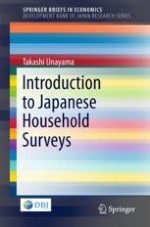
2018 | OriginalPaper | Buchkapitel
1. System of Japanese Household Surveys
verfasst von : Takashi Unayama
Erschienen in: Introduction to Japanese Household Surveys
Verlag: Springer Singapore
Aktivieren Sie unsere intelligente Suche, um passende Fachinhalte oder Patente zu finden.
Wählen Sie Textabschnitte aus um mit Künstlicher Intelligenz passenden Patente zu finden. powered by
Markieren Sie Textabschnitte, um KI-gestützt weitere passende Inhalte zu finden. powered by